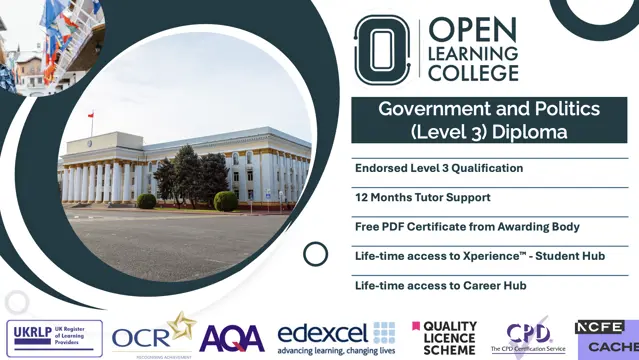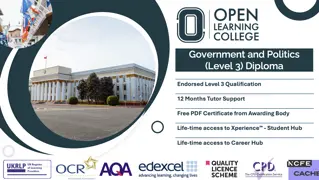
Government and Politics (Level 3) Diploma
Distance Learning Course, featuring tutor support and AI assistance, available online or as a study pack option.
Open Learning College
Summary
Funding options available on our website
- QLS & OPA - Free
- Exam(s) / assessment(s) is included in price
- Tutor is available to students
- TOTUM card included in price What's this?
Add to basket or enquire
Overview
Embark on a transformative learning journey with the UK’s most innovative home study provider, offering courses designed to unlock your true potential and facilitate the career change you desire. Access our distance learning courses directly from anywhere, anytime, and acquire industry-recognised Professional Qualifications essential for advancing in your career.
Specifically, explore the flexible and convenient Government and Politics (Level 3) course, an ideal way to gain a diploma qualification. Whether you aim for further education, improved job prospects, or expanded knowledge, this comprehensive course allows you to prepare thoroughly for exams or careers through home study. Plus, it’s structured to be accessible and beneficial even if you have no prior knowledge in Government and Politics.
Government and Politics is a dynamic and ever-changing subject, always topical for those who enjoy and who are familiar with contemporary issues, developments and debates. Having an interest and knowledge of current affairs, governance and political issues is a major advantage to studying this subject. Skills on how to critically analyse the news and current affairs programmes on radio and television will be taught.
Each module is presented and supported through references to the textbook and carefully selected websites for wider research and reading. Key words are highlighted and explained throughout, and there are regular tasks and questions throughout each module to assess and check that learning has taken place. Government and Politics has a distinct language and terminology which will be taught with activities to help embed these e.g. by writing them on index cards or developing a file of key words as you go along in order to help learn them.
The course is divided into four main parts after which there is an optional assignment.
Achievement
Course media
Resources
- Government and Politics Level 3 (QLS) Course -
Description
Module 1: Democracy and Political Participation
A large section of young adults, ~60% and ~15% of the elderly population do not bother to vote, yet history shows the battles to gain the right for all over 18 years to be able to participate in British politics today. This section defines democracy in the UK context and how this links to membership of the European Union, EU. The history, meaning and the changing of the definition of democracy is explored. This continues with a discussion on the state and government, how they govern and who has power and authority in making the laws. How participation can have effect on these processes ends this topic.
Module 2: Party Policies and Ideas
The UK political system has key, well-known and historically-formed parties, but new parties such as the Green Party and other right wing groups are arising. Better understanding of what these groups stand for, their traditions, ideologies, values and representation will be investigated. Generally each party believes that they are working together with common goals to improving society, and how they do this will be explored. The make-up and development of the main parties is discussed. Pertinent issue-based questions such as ‘is voting fair’ and ‘the participation of women in politics’ are covered.
Module 3: Elections and Pressure Groups
The purpose of elections is in promoting democracy, if this is achievable and its limitations are discussed. The voting system in electing the local, national and European representatives for local councils, the House of Commons and as MEPs in the EU is studied. The electoral system and representation in the UK is very contentious and this will be debated by looking at the election of 2010. The 2010 elections is a particularly useful case study as it resulted in a Coalition government. Detailed case studies involving regional variations, pressure groups and the mayoral elections will be explored.
Module 4: The Constitution and Parliament
An understanding and knowledge of the nature, source and key features of the UK Constitution is investigated. It is uncodified and evolving. Sovereignty, membership of the European Union and devolution is discussed in relation to the Constitution and reformation such as of the House of Lords. The UK alongside New Zealand and Israel are the only countries that do not have a single written constitution, but instead have several documents such as the Magna Carta 1215, the Bill of Rights 1689, the 1701 act of Settlement and the 1911 Act of Parliament. This allows key laws to be able to be changed when the world changes, such as Gay Marriage 2014. The role of parliament, House of Commons and Lords, and how Bills are passed is also explored.
Module 5: The Prime Minister and Cabinet
The role, powers and constraints of the Prime Minister and their cabinet, as well as the opposition and other Members of Parliament, MPs is looked at in detail. The office of the Prime Minister is the executive branch of government. Which leadership style is adopted by the Leading MPs, past and present and whether it should follow the American Presidential style is discussed. Case studies such as the Westland Affair are used to illustrate the duties and functions of the various sections of parliament and the government.
Module 6: Judges and Civil Liberties
The significance of the judiciary in promoting rule-based governance, the power and influence of judges is investigated in terms of civil liberties and individual rights. The role and impact of the Courts, including on the Human Rights Laws, and their relationship with the supreme and European Courts is discussed. Laws are passed by Parliament, before being implemented, so the role of the judiciary on British politics is addressed. The House of Lords is no longer the Supreme or High court in the UK.
Module 7: Economic Policy and Social Welfare, Health and Education
The key policies for all the political parties are addressed. Each issue will be covered in depth to give knowledge about their general relationship between the state and local, national and global market. The management of e.g. Health and the National Health System, NHS, economics and the welfare state and education are of paramount importance to the public. So party policies in relation to each are important during elections and party manifestos promise the future of these key issues. The role of trade unions, particularly in relation to party politics is explored. The module ends with discussions of each issue and changing trends such as an ageing population.
Module 8: Law, Order, Criminal Justice, and the Environmental Policy
A general overview of the law and the criminal justice system, and the position of the political parties in relation to crime, public order and punishment are given. Law and order are discussed in detail as a political issue because it concerns the whole population. How the Police are managed, their structure, changing role and accountability are explored. There have been many changes and historic development and as the nature of crime, disorder, law and punishment have changed, so these will be debated and discussed. The module ends with a discussion of the environmental or Green policy.
Module 9: Impact of EU on the UK and European Integration
The views of individual politicians and different parties about the position and role of the UK in the EU are an extremely contentious issue, with differing views that raise passions and emotions. How the EU impacts on UK policies, the constitution, and the factors that has shaped and affects future policy developments will be addressed. The origin and history of the EU is covered in depth. The principal aim of the EU was to prevent war and to improve trade and prosperity in Europe.
Module 10: EU Institutions, their Relationships and Domestic Policy Issues
The final module continues to look at the EU, its member states and the policy-making power within the EU. The key issues and processes that determine democratic participation and accountability will be explored. The European Commission based in Brussels takes care of the daily running of the EU, but the governance is by an elected European Parliament. Key issues and debated concerning the UK positioning in the EU is discussed from various dimensions such as the Euro-currency to future economic unity and other common policies.
(Please click on the curriculum tab above to see a detailed view of each module)
Who is this course for?
Target Audience
- The course on Government and Politics caters to a broad spectrum of individuals keen on understanding the intricate mechanisms and influences of governance.
- It appeals to students pursuing academic paths in political science, international relations, law, or social sciences, offering them a foundational understanding of political systems.
- Additionally, it serves as a valuable resource for professionals working within governmental organizations, policy analysts, diplomats, journalists, and anyone interested in comprehending the complexities of political landscapes worldwide.
- Moreover, citizens passionate about civic engagement, activism, or seeking a deeper grasp of their country's political structures will find this course enlightening and empowering.
Requirements
Course Requirements
- The good news is that no prior learning knowledge or experience is essential to take this course. This course is openly available to anyone wishing to learn more about Government and Politics (Level 3) and would like to take part in a highly rewarding distance learning study course.
- We believe that everyone should have the opportunity to expand their knowledge and study further, so we try to keep our entry requirements to a minimum.
- You have the freedom to start the course at any time and continue your studies at your own pace for a period of up to 12 months from initial registration with full tutor support.
Career path
Local government officers make sure that the decisions on local government policy made by local councillors are put into action, and that local services are provided correctly
Questions and answers
Certificates
QLS & OPA
Digital certificate - Included
Open Learning College have undergone external quality checks to ensure that the organisation and the courses’ it offers meet a high standard. Regular reviews of our courses are carried out as part of the endorsement process.
The course depth and study has been benchmarked at Level 3 against level descriptors published by Ofqual.
Visit www.qualitylicencescheme.co.uk for more information.
1. You will receive your accreditation directly from QLS, once you have successfully completed your course (certification fees are included in the course fee).
2. You will receive the Open Pathway Accreditation Diploma (OPA.dip) from Open Learning College.
Reviews
Currently there are no reviews for this course. Be the first to leave a review.
Legal information
This course is advertised on reed.co.uk by the Course Provider, whose terms and conditions apply. Purchases are made directly from the Course Provider, and as such, content and materials are supplied by the Course Provider directly. Reed is acting as agent and not reseller in relation to this course. Reed's only responsibility is to facilitate your payment for the course. It is your responsibility to review and agree to the Course Provider's terms and conditions and satisfy yourself as to the suitability of the course you intend to purchase. Reed will not have any responsibility for the content of the course and/or associated materials.



